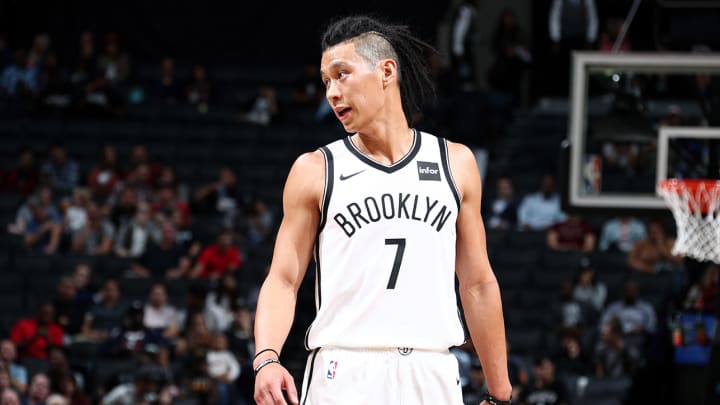The Kenyon Martin-Jeremy Lin 'Feud' Isn’t About Names or Tattoos

Kenyon Martin is not the villain here. Neither is Jeremy Lin. And the internet beef between the former and current Nets stars over Lin’s decision to get dreadlocks doesn’t boil down to a feud, or killing anyone with kindness or someone getting treated. The only losers here are the ones failing to acknowledge Martin and Lin’s right to have a conversation, and who refuse to engage with it.
Lin wrote a thoughtful piece on the Players’ Tribune earlier in the week explaining his decision to get dreads, encouraged by Nets teammate Rondae Hollis-Jefferson, who did so in turn. Hollis-Jefferson is black, and dreadlocks are—of course—a black hairstyle. Lin, who is Asian-American, has drawn media attention and some degree of online confusion, occasionally bordering on mockery, for his varied hairstyles over the past couple seasons. And that’s a conversation for another time—let’s just say more people freaked over Lin’s man-bun and cornrows than all of Spencer Hawes’s questionable variations of beard and hair.
The essence of Lin’s essay acknowledged the issue of appropriation, and Lin never claimed to have the answers. There’s a fine line between respect and mockery when it comes to racial and ethnically-steeped signifiers, and by most accounts, he walked it well. The end note of the piece simply asks readers to have a dialogue. “We need more empathy, more compassion and less judgment. That takes actual work and communication,” he wrote. It’s safe to say the coverage of the aftermath has whiffed on that.
Martin later went on Instagram accusing Lin of “wanting to be black,” and expressed frustration at the Nets organization for allowing him to wear the dreadlocks. “Like, we get it,” Martin says. “But the last name is Lin.” Is Martin entitled as a black man to be upset about Lin adopting a hairstyle steeped in cultural heritage? Completely. Hair is often a symbol of pride and ethnic identity, and he’s allowed to feel like Lin is stepping on that. He can share his opinion with added tact if he wants, but he doesn’t have to read Lin’s essay as sincere.
Lin’s response via comment on Martin’s Instagram post was measured, and pointed to Martin’s Chinese-character tattoos in a manner that at least left little doubt about his thoughtfulness. “At the end of the day, I appreciate that I have dreads and you have Chinese tattoos [because] I think it’s a sign of respect,” Lin wrote. “And I think as minorities, the more that we appreciate each other’s cultures, the more we influence mainstream society.”
There’s a lot going on here, and it’s not about last names or tattoos, but about the collective mainstream unwillingness—or perhaps sheer inability—to engage in the conversation that Martin and Lin started. That’s where we need to cast our attention. Lin’s choice of hairstyle clearly occupies a grey area, and the way he’s tackled the topic acknowledges that. Credit Lin for not positioning himself clearly on a moral high ground that is beside the point. Regardless of who’s right and wrong, casting Martin as angry and misguided fails by perpetuating another deep-seated racial stereotype. It’s a shame that much of the quick-turn coverage of their interactions has emphasized the aspects of conflict—which, intentionally or not, casts it as a feud between two men of color, suggests a need to take sides, and comes across as dismissive.
Mr. President: You Represent All of Us. Don’t Divide Us. Bring Us Together
Lin spoke at length about the topic after a preseason game on Thursday, emphasizing that the issue has nothing to do with someone winning or losing. “All this pitting me against him... whatever creates division, I don’t stand for.” Martin’s response to people who were quick to paint him in the wrong even offered a little more breathing room. “That man grown. That man can rock whatever hairstyle he want to rock. That don’t mean I have to agree with it,” he said. “Second of all, I’m grown; I can say whatever I want to say about whatever I want to say it about. It ain’t about race, it ain’t about none of that. Grow up people. It was a joke. But I don’t like it, I don’t agree with it.”
And with a little objectivity, that’s perfectly fair. Perhaps the real issue is that Martin took heat and felt the need to cop out or back down on any level —a burden people of color can understand, but that others may not. Put yourself in his place, put yourself in Lin’s place, and think for a second. Don’t make Martin the bad guy; instead consider who his critics are, where those criticisms are coming from and why. This entire situation matters because of what it says about us, not about them. And if the product is thoughtful dialogue instead of throwaway internet uproar, we’ll all be a little smarter for it.

Jeremy Woo has covered basketball for SI since 2014, including the NBA draft and weekly Power Rankings. He is from the South Side of Chicago.